3 Volumes
Constitutional Era
American history between the Revolution and the approach of the Civil War, was dominated by the Constitutional Convention in Philadelphia in 1787. Background rumbling was from the French Revolution. The War of 1812 was merely an embarrassment.
Philadephia: America's Capital, 1774-1800
The Continental Congress met in Philadelphia from 1774 to 1788. Next, the new republic had its capital here from 1790 to 1800. Thoroughly Quaker Philadelphia was in the center of the founding twenty-five years when, and where, the enduring political institutions of America emerged.
Four Constitutions
Multi-national unions of republics are uncommon, usually brief and seldom voluntary. America has had three of them, but we only got it right the second time. Uncertain why we succeeded when many others failed, we remain skeptical of changing the rules. The Europeans, on the other hand, are uncertain whether they want to follow the Confederate States of America toward extinction, or the United States of America toward world domination. When deeply considered, it is a hard choice.
...Pre-Convention Events
We had a varsity team, but we needed a plan.
The war officially ended at the Treaty of Paris in 1783, but fighting in the American Revolutionary War had essentially come to an end at the Battle of Yorktown, in 1781. When the Treaty was finally announced, Americans could exult in defeating the strongest military power in the world, and they could also chortle that through clever negotiation good old Ben Franklin had doubled the land mass of the United States by pushing the western border all the way to the Mississippi River. Unfortunately, these celebrations proved to give only brief comfort in the dire economic circumstances the victors found themselves forced to face. Many settled areas had been devastated by invasion, and soldiers returning to their farms were mostly without means to feed their families. Many of them had innocently believed the promises of their government to extend meaningful bonuses, but even back pay had been withheld while inflation destroyed its value. In Massachusetts veteran soldiers under the leadership of Captain Daniel Shay revolted against their creditors because of their pitiable condition, and neither the State of Massachusetts nor the Continental Congress (now called the Confederation Congress) seemed able to make useful efforts to right the many wrongs. Their former leaders in the Continental Army were sympathetic to the soldiers' grievances, but were restrained by their own patriotism from taking firm action to restore order. The state legislatures often simply disappeared rather than take a stand. George Washington was particularly torn by mixed loyalties and duties, made worse by the private conflicted urgings of his generals to do something dramatic. Mixed in this was the advice of his good friend Robert Morris that a country with such rich resources should be able to borrow on its credit, except for incompetence of its legislatures and the inadequacy of its Articles of Confederation. Morris and Alexander Hamilton leaned in the direction of making Washington a king, but Washington was vigorously uncooperative. There were signs the British were beginning to get ideas of regaining these desperate colonies by default, and other signs that the French allies were thinking about ways to make us part of France. Continued weakness would invite invasion. It was a chaotic situation, threatening to get steadily worse, and only the Ocean seemed to shield us from the more or less constant war between England and France.
During 1781-83, British military strength was concentrated in New York City, and Washington placed his own headquarters up the Hudson at Newburgh to guard against sudden British expeditions. During this two-year period of mutinous grumblings among his idle troops, Washington had time to think. Everyone seemed to be writing him, and he was writing to everyone. Finally, he organized his correspondence into a series of Circular Letters, sent periodically to the Governors of the thirteen states, in which he outlined some of his ideas for organizing the government. It seems fair to point to these Circular Letters as the beginning of the ideas which culminated in the convening of a Constitutional Convention in Philadelphia in the Spring of 1787. Scholars have since argued whether the Constitution was James Madison's idea, or whether behind that might have been the grey eminences of John Witherspoon, Robert Morris, or even Benjamin Franklin. The trail from Newburgh to Philadelphia was deliberately obscured by Washington's unwillingness to betray his duty, which included his duty to his soldiers, to his extended family, and his friends, like General Knox. A few extended unwelcome urgings to make him a king, but almost everyone agreed that his support for any effort was indispensable. When he resigned as commander in chief, he probably went too far in declaring his eternal resignation from public life, describing his steadfast determination to return to his farm in Virginia forever. No doubt Mt. Vernon needed his attention. He owned ten miles of waterfront along the Potomac River, often extending four miles inland, and also thousands of acres in Ohio. It was surely galling to his pride that he was losing money on his wife's property, when it would appear the couple were immensely rich. As tobacco planting had depleted the soil, many of his neighboring friends with names like Lee, Mason and Randolph were losing money, too. Perhaps they needed his help in a different way. Perhaps leadership was what Virginia needed to make the Potomac the central transportation artery of a new nation, stretching from Norfolk to the Great Lakes.
He was getting old; his bones ached from sleeping beside many campfires, and riding many horses. Madison and Knox kept urging him to accept a higher call from his nation. But he had devoted a long life to his country, badly neglecting his own family and his Virginia home. One man cannot do everything for everybody, and not everything can always be successful. One must choose, or else drift as others push him. In the end, Washington made a half decision. He would only go ahead if he could be convinced there was a good chance of success. At that sign, little Madison probably knew he had hooked him.
The post-war leaders of the American Revolution had emerged during the eight-year war. They were the best we had, with many traitors, phonies and failures weeded out. Benjamin Franklin had negotiated remarkably favorable terms at the Treaty of Paris, including the Northwest Territory which nearly doubled the size of the nation, now including the land between the Appalachian Mountains and the Mississippi. New waves of immigrants were pouring into the country; Britain and France were occupied with dealing with each other, temporarily anxious for us to leave them alone. We owned a continent immensely rich in resources and promise. True, we had done it guerrilla style, forcing the British to give us generous terms just to be rid of our nuisance and get on with their other wars, get on with getting rich in the British Industrial Revolution, and casually intending to take care of little America, later. True, the French were erratic and hostile. And yes, America was flat broke, inflating itself with worthless paper money. It seemed likely the United States would soon break apart. The national heroes would soon go back to their own affairs, and the spirit of unity and teamwork would dissipate itself. The Indians would butcher the pioneers and discourage immigration, the European nations could eventually settle down and bite off pieces of the New World. That would be a pitiable end to a national movement begun with such promise, and almost everyone wanted to do better. Our battle-tested leaders hadn't fought the Revolution to wallow in self-pity. We had won, and we were going to make the most of our victory. Let the Europeans blubber.
Three men had, more than anyone else, won the Revolution -- Washington, Franklin and Robert Morris, each with an extraordinary victory in the military, diplomatic and financial spheres. We had a "deep bench", too. There was John Dickinson, Alexander Hamilton, James Madison, Thomas Jefferson and many more, besides. We had a varsity team, but we needed a plan to get out of this immediate mess. Gradually, they wrote each other, invited each other to their homes. The British Navy, cruising the coast, had accustomed them to thinking in Continental terms, opened heir eyes to a potential far beyond local fiefdoms. When George Washington sent out feelers to his old friends, they were already disposed to unite in a new adventure.
Washington's Circular Letters
ONCE Cornwallis surrendered to Washington at Yorktown in 1781, there emerged the usual reluctance of troops on both sides to get killed for a dispute that was already settled. The British monarchy had ample experience with wars and fully expected to exploit this trait of exhausted soldiers at the end of one. It was clear to the British the colonies could neither be reconciled nor forcibly subdued. What was not clear was how much national advantage might still be extracted from a peace conference. Bluffs and intransigence might still achieve what bayonets could not. Seasoned diplomats are accustomed to such manipulation, but the new American nation only had Benjamin Franklin grown equal to it, representing Pennsylvania and Massachusetts with the British Ministry for several years. Beyond that, however, a particularly American trait was emerging to quit the game before the last card is played. During the Nineteenth century, anticipating and resisting that irresolute temptation came to be called, Character.
The American Revolutionary Army was seldom well-fed, never well armed. Hardly anyone expected a war lasting eight years, or the British regulars to be so mean and effective. Major General Benedict Arnold had seemed like our perfect soldier but turned traitor while in charge of a major defense position at West Point, New York. Conditions for wives and children at home were bad. And the Congress in Philadelphia was willing to inflate the currency, hold back soldiers' pay, pinch pennies on supplies. Other colonies frequently promised to send more soldiers than they actually supplied. Not that they were proud of themselves; they skulked. Surely, some state legislatures and representatives were better than others, but they are almost impossible to identify, now. They all must have been somewhat complicit, or we would have heard more of them denouncing each other. It must have been supremely painful for Washington to receive promises of troops and supplies that he privately doubted, and then to be obliged to assure his troop's help was forthcoming. Inevitable disillusionment discredited him more than the Governors who put him in that position. The British troops surely shared their enemy's reluctance to get killed for a war that was over. They partied and roistered in New York, but who knows what general in London might suddenly order an attack on Washington at Newburgh, just to make overall British defeat seem less humiliating.
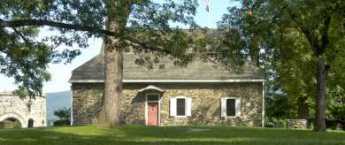
|
| Headquarters, Newburgh NY |
During sixteen months of this agony, Washington wrote many letters to state Governors, keeping them informed while asking for their help. The custodians of the Headquarters museum proudly show the various tables and chairs for his aides to translate French and Spanish, to make thirteen copies of just about everything, and careful files of all correspondence. Washington was an organized person, they say, or else his chief of staff was organized. Someone like Alexander Hamilton, perhaps. Out of all this headquarters communication system gradually emerged the system of Circulars. The General was in a position to see huge deficiencies in the government system for which he dedicated his life, and apparently grew haunted by the idea that all this suffering would be for nothing if the government which emerged was anything like what he was now seeing. His Circulars to the governors began to take on the style of outlining what kind of government the United States ought to have. It must, for example, acquire federal power; the states must turn over more of their own power to the decisions of a single executive. It must pay its debts; a mighty nation does not chisel its creditors. It must suppress the inclination to squabble and think the worst of one another. It must, in his phrase, be virtuous.
Two emphatic views of the new country emerged from Washington's time in Newburgh. The inability of the government to pay its soldiers, suffering or no suffering, was particularly agonizing. And the close call he had with threatened mutiny made it much worse. Robert Morris had run out of tricks and instructed him the central issue was for the Federal government to be able to levy taxes for servicing the debt, which would make it possible to borrow still more through leverage. Washington never forgot this episode, and at several points, during his later presidency, it guided him well. The other episode which made a lasting impression was to some degree his own fault. He was so impassioned in his hatred of monarchy that his closest friends, Hamilton and the two Morrises -- who had never seen much to criticize in a monarchy -- essentially gave up on trying to persuade him, and took the side of General Gates the hero of Saratoga in a planned mutiny. Washington put it down with nothing but the power of his personality and a little play-acting with his bifocals, but he almost lost the confrontation in an instant. Washington had many close calls with death on the battlefield, but these two near-defeats pretty much shaped the rest of his life as our first President. Indeed these two hatreds, of debt and monarchy, continue to characterize many Americans to a degree that others would describe as unreasonable.
And then he made a mistake. As a way of proving his lack of personal motive, he announced in advance he would be leaving public service forever. Today, every lame duck knows that's a bad idea, even when you mean it. And while he may have sincerely thought he meant it at the time, events show he really didn't. Although he probably didn't want to be indispensable, circumstances made him so. He discovered how little he knew of the technical details of government, and thus how much he needed James Madison's help. Washington lacked skill in managing finance; having depended on Robert Morris throughout the war, he needed Alexander Hamilton at least to handle a peaceful economy. But there was no running away from the central issue; he would be forced to recognize how much he overshadowed anyone else in demeanor, and so, how unlikely it was that anyone else could bully others into cooperating. He was a great-souled person, in Aristotle's phrase. Franklin alone perhaps understood and privately doubted that even Washington could pull it off. Washington's Circulars were driving him straight toward seeking the Presidency he widely proclaimed he did not want and would not accept. And thereby he threatened the one thing in life he prized more than any other: his word of honor to keep his promises.
George Washington Demands a Better Constitution
GEORGE Washington was a far more complex person than most people suppose, and he wanted it that way. He was born to be a tall imposing athlete, eventually a bold and dashing soldier. On top of that framework, he carefully constructed a public image of himself as aloof, selfless, inflexibly committed to keeping his word. Parson Weems the biographer may have overdone the image a little, but Washington gave Weems plenty to work with and undoubtedly would have enjoyed overhearing the stories of the cherry tree and tossing the coin across an impossibly wide Potomac. Washington had a bad temper and could remember a grievance for life. He married up, to the richest woman in Virginia.

|
| Potomac River |
Growing up along the wide Potomac River, Washington early conceived a life-long ambition to convert the Potomac into America's main highway to the Mississippi. He did indeed live to watch the nation's new capital start to move into the Potomac swamps across from his Mount Vernon mansion, in a city named for him. For now, retiring from military command with great fanfare and farewells after the Revolution, he returned to private life on this Virginia farm. He made an important political mistake along this path, by vowing in public never to return to public life. During the years after the Revolution but before the new Constitution, his attention quickly returned to building canals along the Potomac River, deepening it for transportation, and connecting its headwaters over a portage in Pennsylvania to the headwaters of the Monongahela River -- hence to the Ohio, then the Mississippi, or up the Allegheny River to the Great Lakes. He personally owned 40,000 acres along this river path to the center of North America. The occasion for a national constitutional convention grew out of a meeting with Maryland to reach an agreement about this Potomac vision, which was being blocked by commercial interests in Baltimore. Ultimately, Baltimore won the commercial race; so it was the Baltimore and Ohio Railroad which captured the early commerce to the west. Washington also made deals, ultimately to Baltimore's benefit, with the James River interests, to give them a share of the development of the Chesapeake Bay trade. As a young man, George Washington had acted as a surveyor for most of this region, and as a young soldier had explored the Indian trade to Pittsburgh, actually starting the French and Indian War during this trip. He was to march it again later with Braddock's army. All the while, Washington dreamed of the day. There were competitors; Philadelphia and New York had similar aspirations for their rivers. Take a look at a globe or Google Earth. Comparatively few of the earth's rivers drain too far western beaches. Even today, long-term victory in worldwide water transportation will likely go to one of many eastern rivers linking up with one of the few western ones. The ultimate world-wide goal has yet to be fulfilled for what continues to be the cheapest of all bulk transportation methods.
Washington at age 54 was already richer than most people need to be; a lot of this Potomac dream was a residual of boyhood ambitions enduring into middle age. In a sense, he had the ambition to make his boyhood home the future center of the universe. Although much of his stock in these real estate enterprises resulted in very little extra wealth, he demonstrated his mixture of public spirit combined with ambition by donating the stock in one of the companies to a future national university, to be located across the river near Georgetown. Since that didn't work out, he later placed the nation's capital there. He had consistently been a far bolder dreamer than Cincinnatus, humble Roman citizen-soldier returning to his farm from the wars.
Washington more or less gave up this Potomac ambition for a loftier one. During the Revolution, he had suffered the most infuriating abuse of himself and his soldiers from the state legislatures. Their urgent demands for victories were seldom matched with resources. The Continental Congress representing those state governments in a weak confederation that could not feed and pay its own troops seemed little better. He could be a mean man to cross, but perhaps with General Cromwell in mind, Washington possessed the firmest and most sincere belief in the proper subservience of military to civilian control. These conflicting feelings resulted in earnest obedience to a group of politicians he surely distrusted. This could not be described as hypocrisy; he respected their rank even though he suffered from their behavior. When Congress paid the troops in worthless currency which they promised to redeem after the war, it became clear that either lack of moral fiber or their system of governance led the states and the Congress in the direction of dishonoring their debt to the soldiers. This was a dreadful system, which led to death and suffering among the loyal troops, forcing the General into the humiliating position of assuring the troops Congress would stand by them, while he privately doubted any chance of it. Washington did not easily forgive or forget. Here was a paltry outcome for eight years of war and suffering; this system of organized dishonor must be improved.
He went about achieving his goal in a way that would not occur to most people. He chose a young ambitious agent, James Madison, who had caught his attention in the Virginia legislature, in the Continental Congress, and in the negotiations with Maryland over the development of the Potomac. Washington schemed with the young man for weeks on end about ways and means, opportunities, dangers, and potential enemies. Perhaps he failed to notice some ways where he and Madison fundamentally differed. Madison himself might not have recognized that his years at Princeton in the Quaker state of New Jersey had exposed him to novel ideas like separation of church and state, which were instantly appealing to the two Virginia Episcopalian religious doubters. Many people he admired, Patrick Henry, in particular, wanted the government to be as weak and ineffective as possible. Unfortunately, when Madison's turn later came for assuming the Presidency, he went along with reliance on diplomacy and persuasion until it almost cost America the War of 1812. Acting as Washington's agent in 1788, Madison was assigned to win over the Virginia legislature, make alliances with other states in Congress, identify friends and enemies, make deals. He performed as brilliantly as he would at the Constitutional Convention, so the basic conflict between the soldier President and his politician assistant was glossed over. As long as the original relationship held together, Washington felt it was useful to remain above and aloof, publicly wavering whether this was all a good idea, but fiercely determined to have a nation he could be proud of. There was to be a Constitutional Convention in Philadelphia, but while Washington was invited, he let it be known he was uncertain whether he should accept the invitation. What he really meant was he would preserve his political credibility for a different approach if this one failed. Considered from Madison's viewpoint however, this clearly meant Washington would dump him if things went badly. Meanwhile, the unknown young Madison on several occasions came to Mount Vernon for three days at a time to talk strategy and give the famous General all the scoop. Today, we would describe Madison as a nerd. The aristocratic Gouverneur Morris never thought much of him. Washington needed him, but there is no evidence he thought of him other than as a glorified butler. Little Madison was awkward among the ladies, a problem inconceivable to either Washington or Morris. But that little mind was surely working, all the time.
Madison was in fact a brilliant politician, a dissembler in a different way, but a severe contrast with his mentor. To begin with, he was a scholar. Both as an undergraduate at Princeton and a graduate student working directly with the great Witherspoon himself, Madison was deeply learned in the history of classical republics. He spent an extra year at Princeton, just to be able to study ancient Hebrew with Witherspoon. But he was innately skilled in the darker arts of politics. When votes were needed, he had a way of persuading three or four other members to vote for a measure, while Madison himself would then vote against it to preserve influence with opponents for later skirmishes. In fact, as matters later turned out, it becomes a little uncertain just how convinced Madison was that Washington's strong central government was a totally good idea. Before and after 1787 Madison expressed a conviction that real sovereignty originated in the states, just as the Articles declared. That was a little too fancy for practical men of affairs, who were uncomfortable to discover how literal Madison was after his break with the Federalists. Twenty years younger than the General. he prospered in the image of being personally close to the titan, and he certainly enjoyed the game of politics. The new Constitution was going to be an improvement over the Articles of Confederation, but Madison did not burn for long with indignation about injustice to the troops, or disdain for nasty little politicians in the state legislatures. These were problems to be solved, not offenses to be punished. The new Constitution was a project where he could advance his career, skillfully demonstrating his prowess at negotiation and manipulation. This is not to say he did not believe in his project, but rather to suspect that he was a blank slate on which he allowed Washington to write, and later allowed others to over-write. He was eventually to modify his opinions as a result of new associations and partners, and since he succeeded Jefferson as President, it was personally useful to adjust his viewpoints to his timing. What would never change was that he was an artful politician, while Washington hated, absolutely hated, partisan politics.
This is not just an emotional division between two particular Virginia plantation owners, but an enduring thread running through all elective politics. Washington set the style for generations of citizen leaders in America. In his mind, a person of honor distinguishes himself in some way before he enters public office, so on the basis of that honorable image, presents himself to voters for public office, and naturally is elected to represent their interests. He is expected to compromise where compromise is honorable and publicly acknowledged, in order to achieve one desirable outcome in concert with other outcomes, in some ways inconsistent but still honorable in combination. He reliably will not vote for either issues or candidates in return for some personal consideration other than the worth of the issue or the candidate, with the possible exception of yielding to the clear preferences of his local district. Such a person is not a member of a political organization very long before he encounters another group of colleagues -- who regularly swap votes for personal advantage, join a group who agree to vote as a unit no matter what the merits, and recognize the frequent necessity to talk one way while secretly voting another. The first sort of politician is usually an amateur, the second type is typically a professional politician. Although it seems a violation of ethics and common public welfare, the fact is the professional vote-swapper almost always beats the sappy amateur. The response during the Eighteenth Century was for idealists to condemn and attempt to abolish partisanship and political parties. The American Constitution does not make provision for political parties and other forms of vote-swapping or even anticipate their emergence. Although Madison ignited the process in the United States, Jefferson really organized it; every recent politician except Adlai Stevenson has openly participated in a version of it. That the Constitution has still not been amended to provide for parties seems to reflect a persisting nostalgic hope that somehow we can return to Washington's stance.
Washington's conception of open representative politics was not entirely perfect, either. In order to maintain an image of impartiality, Washington and his imitators isolated themselves in a cloak, holding back their true opinions in a sphinx-like way that hampered negotiation. Unwillingness to be seen swapping votes can lead to an unwillingness to compromise, and in the final analysis, the difference is one of degree. However, the over-riding issue is that each representative or Senator is equal to every other one. When vote-swapping gets started, it leads to placing power over supposed equals in the hands of the more powerful manipulators, masquerading as political leaders. Ultimately, it leads to the adoption of house rules on the very first day of a session which force lesser members to surrender their votes to a speaker or minority leader or committee chairman, when the theory is that there is no such thing as a lesser member. The claim of a party-line politician is that he obeys the will of the party caucus; the reality is usually that he obeys the will of some tough, self-advancing party leader. The final reality is that most legislatures must now deal with thousands of bills per session, leading to the necessity of appointing someone to set priorities, which in turn leads to the power of party leaders over their grudging servants. These various subversions of the equal rights of elected representatives can lead to such discrediting of the system that honorable people may refuse to stand for office, leaving foxes in charge of the hen house. Benjamin Franklin, who was to play an invisibly controlling role in the impending Constitutional Convention, had his own way of coping with the political environment. "Never ask, never refuse, never resign."
Theater Review: Washington and The Tragedy of Julius Caesar
It was in Eighteenth century style to mix facts with fiction. A classical education was prized among the leadership class, and theater-going was the common style of entertainment; the Founding Fathers often confessed to being influenced by classical examples. In particular, Dr. Samuel Johnson the theater critic in the last half of the Eighteenth century had provoked a major reexamination and revival of popular interest in the Sixteenth-century work of William Shakespeare. Shakespeare was to be revived a second time in America when the English actress Fanny Kemble crossed the ocean and married our richest bachelor, Pierce Butler. We are told that George Washington was an inveterate play-goer who attended many performances of his favorite play, Joseph Addison's Cato, and sometimes carried pages of Shakespeare in his coat. Shakespeare's The Tragedy of Julius Caesar was as widely known at that time as it is today, after countless performances by high school theater groups. Our present affection for the Roman Republic can be traced to its Eighteenth-century revival in several of Shakespeare's plays. Its effect on the minds of the Founding Fathers is as sure as the effect of Sophocles on the mind of Pericles, which no amount of scholarship about his actual attendance at performances of Oedipus Rex can diminish.
The tragedy of Julius Caesar is really the tragedy of Brutus, the nobleman who embodied the true spirit of the Roman Republic. In a larger sense, it can be considered an essay on the relative merits of a republic and a king. Caesar is assassinated early in the play, which depicts very little of the qualities which made him the hero of Rome. He seems to function in this play as a symbol, marching onto the stage in the midst of public adoration, but mainly serving only briefly as a prop about which others whisper their opinions. The public may love him, but many of the Senators are jealous of his eminence and fearful of his ambition. Marullus seems to speak for the disgruntled supporters of Pompey, whom Caesar had defeated when he criticizes the common people for switching loyalties so easily. Cassius speaks for many Senators in saying,
"I was born free as Caesar; so were you: We both have fed as well, and we can both Endure the winter's cold as well as he".
In a few short lines, Shakespeare defines the main weakness of a Republic. It can take Cicero years to convince the common people of the value to them of a republic. But even then, it is all Greek to them, easily brushed aside as boring academic blather. The complicated values of representative government are swept away in a moment by some power-mad soldier who wishes to make himself a tyrant, dazzling common folk with a military victory, or as Marc Antony would soon demonstrate, with a single clever speech. Republics are fragile things, hard to establish, easy to demolish. The man of honor makes his reputation through national service first, and Senatorial position is bestowed on him as a reward. But once an ambitious common man achieves the office by luck or stealth, he soon sees the elevation as itself sufficient reason why he should now be King. Shakespeare is even-handed in this play, which is in many ways an essay on the nature of governance. The recurrent problem of one-man rule is the issue of succession. Written in 1599 with the barren Elizabeth on the throne highlighting the issue of Henry VIII's turmoils with lack of an heir, the first word the title character utters is "Calpurnia", the name of Caesar's barren wife. Now little noticed by contemporary audiences, it must nevertheless have had an important impact on the barren George Washington in his proscenium box, perhaps seated next to Martha and her children by an earlier marriage.
Not long before Washington is known to have taken active steps to encourage a Constitutional Convention, but after he had issued his Circular Letters defining the needs of a new government, a momentous event took place in his life. He went to the Confederation Congress, then meeting in Annapolis, to present his resignation as commander in chief. Not satisfied with triumphant accolades such as Ulysses Grant and Dwight Eisenhower received, he went on to announce his permanent retirement from public life. Probably intending merely to put an end to the offers of Monarchy that his friends had been repeatedly urging, he was very likely startled by the world-wide acclaim his renunciation had provoked. It seems to be true that even George III of England greeted this unexpected resignation as something which made Washington the greatest man in the world. Washington intended to put an end to talk of monarchy, but this action slammed the door loud and irretrievably. No one can prove, but who can possibly disprove, that Julius Caesar was on his mind. Listen to Casca describe the wide-spread suspicion of hypocrisy when Caesar thrice refused the offer from Mark Antony:
CASCA I can as well be hanged as tell the manner of it: it was mere foolery; I did not mark it. I saw Mark Antony offer him a crown;--yet 'twas not a crown neither, 'twas one of these coronets;--and, as I told you, he put it by once: but, for all that, to my thinking, he would fain have had it. Then he offered it to him again; then he put it by again: but, to my thinking, he was very loath to lay his fingers off it. And then he offered it the third time; he put it the third time by: and still as he refused it, the rabblement hooted and clapped their chapped hands and threw up their sweaty night-caps and uttered such a deal of stinking breath because Caesar refused the crown that it had almost choked Caesar; for he swounded and fell down at it: and for mine own part, I durst not laugh, for fear of opening my lips and receiving the bad air.
Washington was now surely boxed in. How in the world could he save his country from anarchy, knowing that almost no one else could do it, and still escape the sneers of Casca and his like? He had told Martha and his closest friends, he had told the whole world, that being First in War was enough. If Julius Caesar couldn't do it, how could Washington expect to go on and be First in Peace, while remaining First in the Hearts of His Countrymen?
A Gleam in Washington's Eye
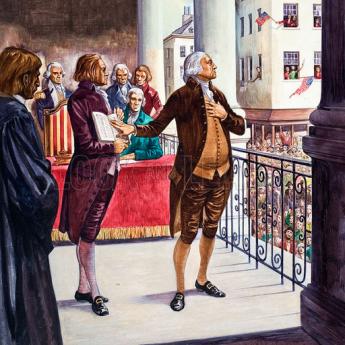
|
| George Washington Taking Oath |
On the eve of the Constitutional Convention, the nation was unhappy, confused, and dissatisfied; this wasn't what a victory was supposed to feel like. George Washington wanted a country to be proud of, big enough to discourage enemies, otherwise free of policing, regulation, or monarchy. Eight years of war had taught him it wasn't easy to have both liberty and discipline at the same time. Perhaps America was more unusually blessed, however, defended from invasion by oceans and wilderness, and from greed by a continent of natural resources. If order and justice could be organized, perhaps this by itself would enlist the loyalty of that mixture of classes and nationalities then flocking to our shores. Several important writers were having a strong influence on the era we now call the Enlightenment; David Hume and Adam Smith in Scotland, Edward Gibbon in England, Voltaire and Diderot in France, even Catherine the Great of Russia, with a thousand others including Benjamin Franklin and Robert Morris. Although Washington probably hadn't read them, Adam Smith's The Wealth of Nations showed unvarnished new ways of looking at commerce and politics, while Gibbon's The Decline and Fall of the Roman Empire showed what could happen if idealism gets neglected. Both books were published in the portentous year of 1776, describing many difficulties, but always suggesting problems could somehow be solved. There were plenty of ideas in circulation, but there was no plan.
It must have become obvious to Washington well before the Battle of Yorktown, that the Revolutionary War would not leave us with our problems solved. There was one brief moment as the British Army was withdrawing from Philadelphia in 1778 which seemingly justified boasts our troops had licked 'em. Just after the surrender of a whole British Army at the Battle of Saratoga, the British were also retreating from Philadelphia, and the Lord North offered generous peace terms through the Earl of Carlisle. No doubt the British public was restless after the Burgoyne defeat and the French alliance with America. Because the Carlisle episode is much more familiar in England than in America, perhaps it was a feint or a maneuver to embarrass the Earl of Carlisle or possibly just an exploration of the true state of affairs which were rumored about across a wide ocean. At any event, Gouverneur Morris was the visible American actor in this puzzling episode, but he must have been acting in concert with others. Lord North offered to give us our own elected parliament within a commonwealth; taxation with representation, no less. Morris seems to have dismissed this offer with contempt. But six more years of devastation ensued, surely convincing Washington that bitter defeat was still possible. That reality was concealed behind the graciousness of the French in allowing us to claim American troops had defeated the British at Yorktown. In fact, the preponderance of troop casualties, naval vessels and strategy had been French. The money had been mostly French as well. If that debt nearly bankrupted France, what might it have done to America?
Washington had been an outstanding athlete, soldier, and farmer, but his many travels about the colonies convinced him something more than leadership was needed. You just can't defeat a powerful enemy with short enlistments which give soldiers a legal right to go home on the eve of battle, and no way for the central command to extend the enlistments. To this, Robert Morris added that you can't buy gunpowder without the central power to levy taxes to pay for them. Morris warned him more was needed than a confederation so big others would leave it alone. Even temporary power wasn't enough. National disorganization had been just as bad after the Revolution as before. By 1787, Washington concluded the states just would not surrender power to a central national government unless the people forced them to give it up, and after a brief patriotic fervor, the people mostly wanted to go home for spring plowing. Peacetime also demonstrated another discouraging truth: meaningful improvement of the existing order meant the whole previous leadership class might leave public service to less qualified leaders, watching peace attract mediocrity to political office. Prominent men in the community gathered in a Constitutional Convention recognized the advantages of Union and devising peaceful ways to maintain it. After that transient moment when the memory of the war was fresh, politics could return to the mediocrities of a political class. That's not exactly what is now meant by "We, the People", but it might have to serve. In Washington's view, the voice of the people usually echoed along the lines of Tell us what good it would do to upset the Articles of Confederation, otherwise leave them alone. If you propose the general shape of a new central government, first tell us what it can do better than the states. And then show us how to make dubious state politicians agree to it. The accents of hesitation and defeat echo powerfully.
The hideous French Revolution was soon to demonstrate how unwise it was to look for short-cuts; we need a republic, not a stampeded democracy. George Washington was unsure just what was needed, but he knew a few basic things with certainty. America needed a bargain which everyone was expected to keep. A stronger central government should be provided for, and make it difficult to dissolve.
Annapolis Convention

|
| Potomac River |
The Annapolis Convention had the original purpose of negotiating the joint ownership issues of the Potomac River between Virginia and Maryland. It seemed quite a natural thing to extend the discussion to other rivers which needed interstate cooperation, particularly the Susquehanna (Maryland and Pennsylvania) and Delaware (Pennsylvania, New Jersey, Delaware, and New York). That was at least six of the thirteen colonies, where Maryland and Virginia would find uniformity of rules to be advisable. It did not take too much imagination to suppose that the remaining states would wish to be involved, as well. It seems that much of the push for enlarging the local river discussion into a national discussion of broader issues came from Alexander Hamilton.
Reference 8500/14
The Origin of States Rights, a Rumination
ALMOST alone among the British colonies in America, Pennsylvania's western border was specified in the King's charter of the colony. It was "five degrees longitude west of the point where the eastern boundary crosses the Delaware" [River]; however, its actual location on the ground was not actually marked until 1784. It's a few miles west of the present city of Pittsburgh, located at the forks of the Ohio River, where the Allegheny and Monongahela Rivers join. However, until 1784 it was not a certainty that this complex was within Pennsylvania instead of Virginia. The origin of Ohio is at the only major water gap in the North-South mountains, and the tributary rivers are fairly large. The three merging rivers thus form a nearly continuous water route along the base of the mountain range, from the Great Lakes south to Pittsburgh, or from the Chesapeake Bay north to Pittsburgh, and then to the Mississippi, going past the best topsoil farming land in the world. The forks of Ohio were the great prize of the Seventeenth and Eighteenth centuries, the place where young George Washington himself started the French and Indian War. To include these treasures, it seems vaguely possible that William Penn insisted on having the border of his state safely include the water gap at the beginning of Ohio. Perhaps not, of course, perhaps it was just a sense of tidiness on the part of the ministers of Charles II. The original document stated that the border was a hundred miles east of there, to match where Maryland ended. When the document was returned to Penn by the King's ministers, however, it had the new language.
The existence of this north-south termination of Pennsylvania began to take on a new significance when other states made claims for their land grant to extend to the Pacific Ocean, and the extensions collided with each other. Virginia then developed its territory to include modern Kentucky and West Virginia. That resulted in Virginia's land aspirations veering northward, to include the Ohio Territory west of Pennsylvania's fixed boundary. By the legal standards of the day, Virginia had a fairly good claim to all of the Indian territories, not merely to the west of Pennsylvania, but extending at least to the Great Lakes, perhaps farther. Maryland, Connecticut, New York, and Massachusetts had conflicting claims from an infinite extension of their western boundaries. As a consequence, it was impossible to achieve ratification of the Articles of Confederation for five years. The various states involved were fearful of the creation of a combined political entity might result in a court which would be enabled to rule against their individual aspirations. The stakes were high; the land mass involved would be several times as large as England.
The person who finally broke this deadlock might well have been Robert Morris, who was disturbed that this inter-state dissension was injuring his ability to borrow foreign funds for the Revolutionary War. The internal negotiations took place under wartime conditions, and are poorly researched. No doubt some person deserves credit for bringing this wrangle to a close. Virginia had the strongest claim, New York the weakest. New York gave up its claim first, Maryland was the last, and Virginia the most disappointed. Pennsylvania, unable to make a claim, took the position that the land belonged to everyone, and eventually was mollified by getting a small notch of land extending to the Great Lakes at Erie. It must be noticed in passing that final resolution of the land claims came at the Treaty of Paris ending the Revolution. Benjamin Franklin, soon to become President of Pennsylvania, was the negotiator of the treaty which reflected Pennsylvania's position that the land belonged to all of us, right?
Even without these western land claims, Virginia was the largest and richest of the colonies, and rather easily adopted the attitude that Virginia would be the leader of the new United States. From their viewpoint, the preservation of states rights would enhance Virginia's leading the country. More or less immediately, the attitude of small states like Delaware hardened into resistance that this must not happen. Much otherwise inexplicable behavior also begins to make a sort of sense: the perverse behavior of the Lee family in the Continental Congress, the quarrels within George Washington's cabinet, the relocation of the capital and the dreams of the Potomac as the nation's main portal of transportation, the rise of Jefferson's political party, the obstructionist behavior of Patrick Henry, the Virginia domination of the Presidency for decades, and countless less famous episodes of history -- make more sense as residuals of Virginia's early land aspirations, than as defenses of slavery or philosophical convictions that states were somehow superior to nations. These suspicions are difficult to clarify and impossible to prove. The best way to see some substance to them is to imagine yourself in the Virginia House of Burgesses, politically connected and vigorous, able to imagine your descendants all inheriting a county or two of rich land as a remote consequence of a few glamorous deeds by their Cavalier ancestor.
The Virginia Plan
After a long period of dissatisfaction with the Articles of Confederation, and much scheming by Virginians, a convention of the thirteen states was called to meet in Philadelphia in late May 1787. George Washington agreed to attend, which assured the attendance of others, and James Madison tended to the myriad details of getting the Confederation Congress to agree to hold the convention, the thirteen states to appoint notable delegates to it, and the notables themselves to agree to the duty of attending. The long hand of George Washington directed much of the activity, and although he had professed uncertainty about the propriety of his attending, it was universally assumed that he would be the presiding officer. Although Madison had been skillful in stirring up widespread national approval, this was quite obviously a Virginia initiative. Virginia was the largest and richest state in the union, and quite easily fell into the idea that the responsibilities of leadership belonged to Virginia.
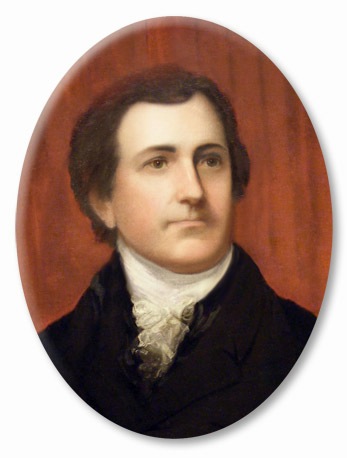
|
| Edmond Randolph |
Travel was uncertain in the Eighteenth century, and the delegates straggled into Philadelphia. Virginia naturally took care to arrive early, and its delegates held a number of informal meetings in various Philadelphia locations. By May 29, 1787, the Virginia delegation had greeted the incoming members from other states, taking care to pass around the notion that Virginia had a plan, or at least a proposal to begin the discussion. We are told that just about every word of the Virginia Plan was written by James Madison, although it was introduced to the Convention by Virginia's Governor, Edmond Randolph. It consisted of fifteen resolves or proposals, phrased as potential amendments to the Articles of Confederation. Since the Articles contained very little description of the details of government except to create a Congress, the proposed amendments were essentially only one amendment: Congress should be bicameral instead of having only one chamber, and the members of one chamber should be elected by the states in numbers proportionate to population size. Since Virginia had the largest population, that was scarcely a surprise, although not invariably a welcome surprise. To some of the small states, Virginia was saying that all our national problems came about because insufficient power had been given to Virginia. But it was a place to begin discussions, and since ten of the thirteen were small states, it was only a matter of time before the smaller states would propose something different. And sure enough, there promptly emerged what was known as the New Jersey Plan, proposing a unicameral Legislature, with an equal number of votes for every state. There were a few other ideas in both plans, but it was immediately apparent that the convention was going to begin with the rules of the Legislature, and would go no further unless small states and large ones could find a way to share power to their mutual satisfaction. With the Articles of Confederation, we had taken a major step toward a single unified nation. But it had not worked, and if the Convention could not find a way to make Union workable, the next step was not going to be a reversion to the Confederation Congress. It was most likely to result in thirteen independent countries, quarreling with each other, and eventually probably going to war with each other about something.
Jury Nullification
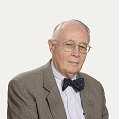 |
| Tom Monteverde |
We must be grateful to the late distinguished litigator, Tom Monteverde, for reminding us of the importance of the jury in American history. Juries seldom realize how much power they can have if they unite on a common purpose. In fact, juries have the implicit right to veto almost anything the rest of government does, by rendering it unenforceable. If the jury opinion is a majority view, nothing but a civil war can legally stop them. So it helped Washington to have jury nullification seem an invincible Quaker idea, while the South trusted a rich slave-owner who had renounced power.
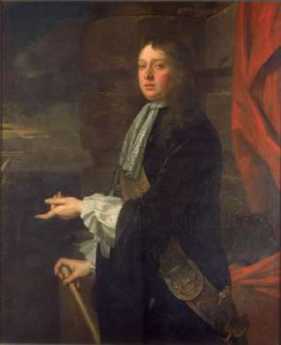 |
| William Penn |
The right to a jury trial originated in the Magna Carta in 1215, but a jury's essentially unlimited power was established four centuries later by Quakers. The legal revolution grew out of the 1670 Hay-market case, where the defendant was William Penn, himself. Penn was accused of the awesome crime of preaching Quakerism to an unlawful assembly, and while he freely admitted his guilt he challenged the righteousness of such a law. The jury refused to convict him. The judge thus faced a defendant who said he was guilty and a jury who said he wasn't. So, the exasperated judge responded -- by putting the jury in jail without food.
The juror Edward Bushell appealed to the Court of Common Pleas, where the problem took on a new dimension. The Justices certainly didn't want juries flouting the law, but nevertheless couldn't condone a jury being punished for its verdict. Chief Justice Vaughn decided that intimidating a jury was worse than extending its powers, so the verdict of Not Guilty was upheld, and Penn was set free. Essentially, Vaughn agreed that any jury that wasn't allowed to acquit was not really a jury. In this way, the legal principle of Jury Nullification of a Law was created. A verdict of not guilty couldn't make William Penn innocent, because he pleaded guilty. A verdict of not guilty, under these circumstances, meant the law had been rejected. Jury nullification thus got to be part of English Common Law, hence ultimately part of the American judicial system.
 |
| Andrew Hamilton |
This piece of common law was a pointed restatement of just who was entitled to make laws in a nation, whether or not nominally it was ruled by a king or a congress. Repeated British evasion of the principles of jury trial became an important reason the American colonists eventually went to war for independence, and probably a better one than some others. The 1735 trial of Peter Zenger was an instance where Andrew Hamilton, the original "Philadelphia Lawyer", convinced a jury that British law, blocking newspapers from criticizing public officials for improper conduct, was too outrageous to deserve enforcement in their court. In that case, jury defiance became even more likely when the judge instructed the annoyed jury that "the truth is no defense". Benjamin Franklin's Pennsylvania Gazette was here quick to come to the side of jury nullification, saying, "If it is not the law, it ought to be law, and will always be law wherever justice prevails." Franklin quickly became allied with Andrew Hamilton, who became Speaker of the Pennsylvania Assembly.
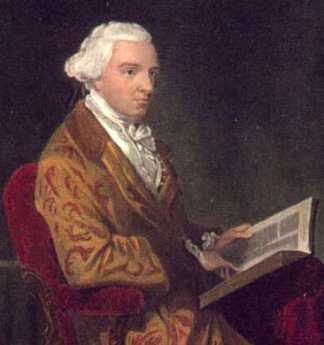 |
| John Hancock |
The Zenger case was often stated to be the origin of the Freedom of the Press in our Constitution fifty years later, but in fact the First Amendment merely provides that Congress shall pass no laws like that. Hamilton had persuaded the Zenger jury they already had the power to stop enforcement of such tyranny, and the First Amendment could be seen as trying to prevent enactment of laws that will foreseeably incite a jury to revolt.
The Navigation Acts of the British government, for example, were predictably offensive to the American colonists, whose randomly chosen representatives on juries were then rendered useless with their wide-spread refusal to convict. This, in turn, provoked the British ministry. John Adams made a particularly famous defense of John Hancock who was being punished with confiscation of his ship and a fine of triple the cargo's value. Adams was later singled out as the only named American rebel the British refused to exempt from hanging if they caught him. As everyone knows, Hancock was the first to step up and sign the Declaration of Independence, because by 1776 there was widespread colonial outrage over the British strategy of transferring cases to the (non-jury) Admiralty Court. Many colonists who privately regarded Hancock as a smuggler were roused to rebellion by the British government thus denying a defendant his right to a jury trial, especially by a jury almost certain not to convict him. To taxation without representation was added the obscenity of enforcement without due process. John Jay, the first Chief Justice of the Supreme Court of the newly created United States, ruled in 1794 that "The Jury has the right to determine the law as well as the facts." And Thomas Jefferson built a whole political party on the right of common people to overturn their government, somewhat softening, it is true, when he grasped where the French Revolution was heading. Jury Nullification then lay fairly dormant for fifty years. But since the founding of the Republic and the reputation of many of the most prominent founders was based on it, there was scarcely need for any emphasis.
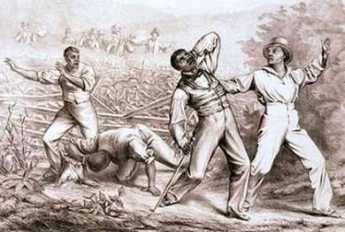 |
| Slave |
And then, the Fugitive Slave Law of 1850 began to sink in. It became evident that juries in the Northern states would routinely refuse to convict anyone under that law, or under the Dred Scott decision, or any other similar mandate of any branch of government. In effect, Northern juries threw down the gauntlet that if you wanted to preserve the right of trial by jury, you had better stop prosecuting those who flouted the Fugitive Slave law. In even broader terms, if you want to preserve a national government, you had better be cautious about strong-arming any impassioned local consensus. A rough translation of that in detail was that no filibuster, no log-rolling, no compromises, no oratory, no threats or other maneuvers in Congress were going to compel Northern juries to enforce slavery within their boundaries of control. All statutes lose some of their majesties when the congressional voting process is intensely examined, and public scrutiny of this law's passage had been particularly searching. Even if Southern congressmen would be successful in passing such laws, it wasn't going to have any effect around here. The leaders of Southern states quickly got a related message, and their own translation of it was, "We have got to declare our independence from this system of government that won't enforce its own laws". If juries can nullify, then states can nullify, and the national union was coming to an end. Both sides disagreed so strongly on this one issue they were willing, for the second time, to risk war for it.
Ku Klux Klan
The idea should be resisted that Jury Nullification is always a good thing. After the Civil War, many of the activities of the Ku Klux Klan were tolerated by sympathetic juries. Many lynch mobs of the Wild, Wild West were encouraged in the name of law and order. Prohibition of alcohol by the Volstead Act was imposed on one part of society by another, and Jury Nullification effectively endorsed rum-running, racketeering, and organized crime. The use of marijuana and abortion are two further examples where disagreement is so strong that compromise eludes us. What is at stake here is protecting the rights of a minority, within a society run by a majority. If minority belief is strong enough, jury nullification issues an unmistakable proclamation: "To proceed farther, means War."
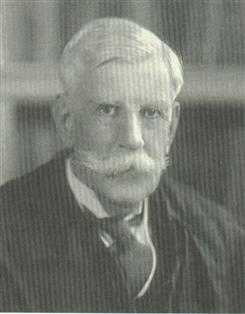 |
| Oliver Wendell Holmes |
That's a somewhat strange outcome for a process started by pacifist Quakers, so the search goes on for a better idea. Distinguished jurists differ on whether to leave things as they are. In a famous exchange, Oliver Wendell Holmes once had dinner with Judge Learned Hand, who on parting extended a lawyer jocularity, "Do justice, Sir, do justice." To which, Holmes then made the somewhat surly response, "That is not my job. My job is to apply the law."
Thus lacking any better approach, it is hard to blame the US Supreme Court for deciding this was something best left unmentioned any more than absolutely necessary. The signal which Justice Harlan gave in the majority opinion on the 1895 Sparf case was the very narrow ruling that a case may not be appealed, solely on the basis that the trial jury was not informed of its right to nullify the law in question. Encouraged by this vague hint, what has evolved has been a growing requirement that incoming jurors take an oath "to uphold the law", officers of the court (ie lawyers)are discouraged from informing a jury of its true power to nullify laws, and Judges are required to inform the jury in their charge that they are to "take the law as the judge lays it down" (ie leave appeals to higher courts). If a jury feels so strongly that it then persists in spite of those restraints, well, you apparently can't stop them. Nobody thinks this is a perfect solution, and aggrieved defendants like the Vietnam War protesters are quite vocal in their belief that the U.S. Supreme Court finally emerged with a visibly asinine principle: a jury does indeed have the right to nullify, but only as long as that jury is unaware it has that right. That's almost an open invitation to perjury if accurate; but while it's not precisely accurate, it comes close to being substantially true.
That's where matters stand, and apparently will stand, until someone finds better arguments than those of Benjamin Franklin, John Jay, Andrew Hamilton -- and William Penn.
8 Blogs
Washington's Circular Letters
 During the dismal days of 1782-3, Washington was confronted with the first of many examples of the American tendency to quit a war before it is completely won.
During the dismal days of 1782-3, Washington was confronted with the first of many examples of the American tendency to quit a war before it is completely won.
George Washington Demands a Better Constitution
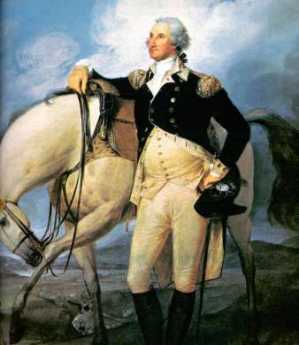 George Washington was an athlete, a soldier, and an adventurous leader. It is less appreciated that he constructed that aloof public image of himself, cloaking an activist politician and rather ambitious real estate developer. We got a new Constitution because he wanted a new constitution.
George Washington was an athlete, a soldier, and an adventurous leader. It is less appreciated that he constructed that aloof public image of himself, cloaking an activist politician and rather ambitious real estate developer. We got a new Constitution because he wanted a new constitution.
Theater Review: Washington and The Tragedy of Julius Caesar
The New England town meeting was based on the ancient Greek model of democracy, but the model for the United States was the Roman Republic. It has been argued that a Republic allows representative government to operate on a wider scale, but there is more to it than that.
A Gleam in Washington's Eye
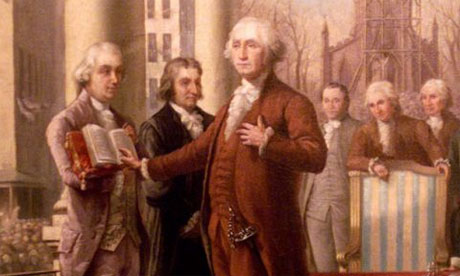 Section 8 of Article I of the Constitution contains the enumerated powers of Congress, and Section 9 contains some prohibitions of Congressional power. Taken together, these "powers" constitute the arguments that a Union is superior to a Confederation. In the aggregate, they represent the reasons why we created a Union.
Section 8 of Article I of the Constitution contains the enumerated powers of Congress, and Section 9 contains some prohibitions of Congressional power. Taken together, these "powers" constitute the arguments that a Union is superior to a Confederation. In the aggregate, they represent the reasons why we created a Union.
Annapolis Convention
 The Annapolis Convention now appears as if its call for a Constitutional Convention was the real intent. But there were legitimate reasons to call for a more germane extension of its original purpose.
The Annapolis Convention now appears as if its call for a Constitutional Convention was the real intent. But there were legitimate reasons to call for a more germane extension of its original purpose.
The Origin of States Rights, a Rumination
The clamor for States Rights probably began with Virginia's claims for western territories.
The Virginia Plan
 Virginia started the idea of a Constitutional Convention, called the meeting for Philadelphia in 1787, got there early and produced the Virginia Plan as the beginning point for deliberations. It was mostly a group of amendments to the Articles of Confederation, and it was mostly the work of James Madison.
Virginia started the idea of a Constitutional Convention, called the meeting for Philadelphia in 1787, got there early and produced the Virginia Plan as the beginning point for deliberations. It was mostly a group of amendments to the Articles of Confederation, and it was mostly the work of James Madison.
Jury Nullification
 William Penn demonstrated one of the most incisive legal minds in England by trapping the British courts in what remains a central unresolved dilemma for the law. He was the defendant in his own case. By the South's way of looking at things, it was a pacifist effort to restrain mindless abolitionism. Meanwhile, both sides calculated it would win if the South decided to fight.
William Penn demonstrated one of the most incisive legal minds in England by trapping the British courts in what remains a central unresolved dilemma for the law. He was the defendant in his own case. By the South's way of looking at things, it was a pacifist effort to restrain mindless abolitionism. Meanwhile, both sides calculated it would win if the South decided to fight.